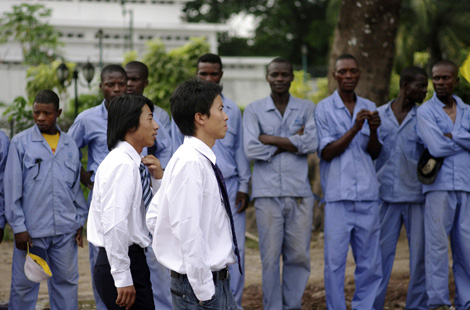Thinking Through Beijing’s Billions
More on:

I have a new piece over at Foreign Policy about China’s money—or, more precisely, about how China’s foreign policy ambitions could change the way it deploys aid, loans, and strategic investment.
I’ve blogged pretty regularly here at Asia Unbound about how China and India are enlarging their seats at many of the top tables of contemporary international relations. And back in April, when I blogged about some of the choices and challenges this raises for India’s foreign policy, I promised to do the same for China. My Foreign Policy piece is one effort to do just that.
Here’s the thing about China:
Then Deputy Secretary of State Robert B. Zoellick famously argued that China, as a “stakeholder” in the international system, ought to support, sustain, and adapt the system that has enabled China’s own success. He even took his counterpart, Vice Foreign Minister Dai Bingguo, to President Franklin D. Roosevelt’s home in Hyde Park, New York, to drive home the point.
And make no mistake: calling China a “stakeholder” isn’t inviting China to be one. China’s stake is a fact of life.
China is a stakeholder in the prevailing system: It’s a permanent member of the UN Security Council, a WTO member, and a signatory to protocols on everything from ozone depletion to chemical weapons. China is in the G20, which has largely supplanted the G8. China is also part of the G8 outreach through the G8 Plus Five. It’s on the Financial Stability Board. And Beijing’s stake is growing every day. When I blogged back in April, rich countries had just agreed to give up 3.1 percentage points of voting shares in the World Bank and to give China, India, and other emerging economies greater voting power. So in the case of the Bretton Woods institutions, this means that China is a quite literally a stakeholder—it has a numerical percentage of the voting shares.
Here, then, is the issue:
How will China reconcile its own practices with its growing weight in such multilateral institutions—with their different practices and lending policies. Too often, these have come into conflict.
Such issues are important because Chinese foreign policymakers now have some tough choices to make—choices they haven’t faced until recently because Beijing’s weight and international profile were simply too small.
Here are three pivotal questions:
(1) Will China predominantly act alone or in concert with others?
This is an essential issue for Chinese foreign policy because Beijing has embraced multilateralism in so many areas. But China has acted far less multilaterally when it comes to spreading its money around the world. China is an aid donor. But as I note in the Foreign Policy piece, it still prefers to make its contributions bilaterally, not through international institutions or in the company of others at multilateral donors conferences. And it generally prefers writing checks during state and official visits.
Chinese aid to Afghanistan offers an example. At an international conference last year in the Hague, Beijing converted $75 million of its loans to Kabul into grants—in effect, turning it into aid. But much of its assistance to Afghanistan has been bilateral. Total Chinese aid is US$132 million since 2002, and it has huge investments, including the Aynak copper mine and associated infrastructure.
And yet as China becomes more powerful, it will come under greater pressure to act jointly with other donors. That raises some intriguing tests: Will China coordinate its assistance with other nations, perhaps even finding ways to pursue and enhance coordination with the Develoment Assistance Committee of the OECD? And will it coordinate strategies at multilateral donors conferences in addition to writing checks?
(2) How, and in what ways, might China’s money support or undermine reforms?
The Bretton Woods institutions usually condition their loans, not least to establish incentives for promoting reforms in governance and economic management. China also imposes conditions on the recipients of its money. But these conditions—for instance, requiring recipients to buy and hire from China—don’t much aim to reduce graft, increase transparency, or improve conditions for private sector firms. So in Central Asia, for example, why would a government look to the Bretton Woods system for cash, when the cash is so readily available from Beijing without the same strings?
(3) Will China’s orientation change as its overseas trade and investment profile further expands?
Put differently, will Chinese commercial engagement produce convergence with the United States and others in rough, tough investment environments? Conventional wisdom is that it will not. We mostly take for granted that Chinese companies can bear more risk, or that China’s government will underwrite the kind of risks that most other governments shy away from.
But in an uncertain market climate, can Chinese firms truly flout such risks forever? I wonder.
For a China whose posture and profile are growing on the international stage, these are precisely the sorts of choices its foreign policymakers, not just its bankers or aid officials, will increasingly need to confront.
And the answer will say a great deal indeed about the direction in which China is heading.
More on:
 Online Store
Online Store